PSER Program is a poverty alleviation and welfare program launched by the Government of Punjab to improve the financial lives of people living below the poverty line in Pakistan. This program has been started by Chief Minister Punjab Maryam Nawaz Sharif, she said in her recent meeting that we regret that NSER data is incomplete.
PSER Program It is not possible to trace the poverty of a poor person through this, which is why when the Nigehban program started, their bread and aid did not reach the deserving. Hence this Punjab Economic Survey Registration is being started in which the data of all the poor will be collected and their financial conditions will be evaluated.
More than 12,000 registration centers have been set up across Punjab, besides the PSER portal has also been set up. Through this portal, people will be able to register themselves at home. In this article we will provide you complete details about PSER survey and also complete details about registration.
How to register on PSER portal?
Registering on the PSER portal is a straightforward process.
Here’s a step-by-step guide to help you:
Step 1:
- Visit the PSER website.
- Visit the official website of PSER.
- Click the “Register” button in the upper right corner.
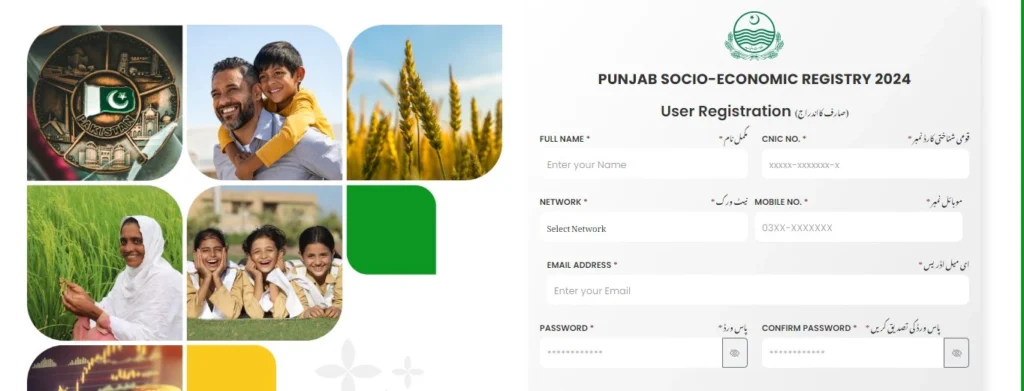
Step 2:
Enter basic information.
- Enter your
- full name
- National Identity Card (CNIC) no
- mobile number
- Email address
- Password (create a strong password)
- Click “Next”.
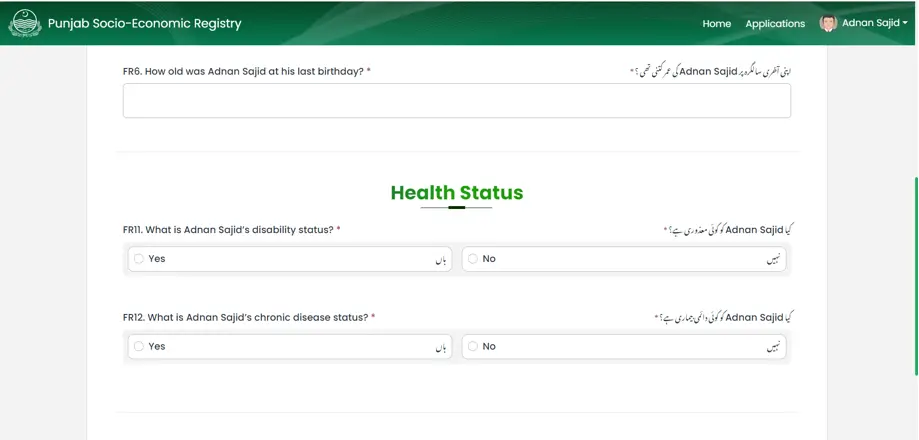
Step 3:
- Verify the mobile number.
- Enter the verification code sent to your mobile number.
- Click “Confirm”.
Step 4:
Fill the registration form.
- Enter your name
- Name of family head
- CNIC number of the family head
- Date of Birth of Head of Family
- marital status
- Educational quality
- Employment status
- Income details
- Click “Next”.
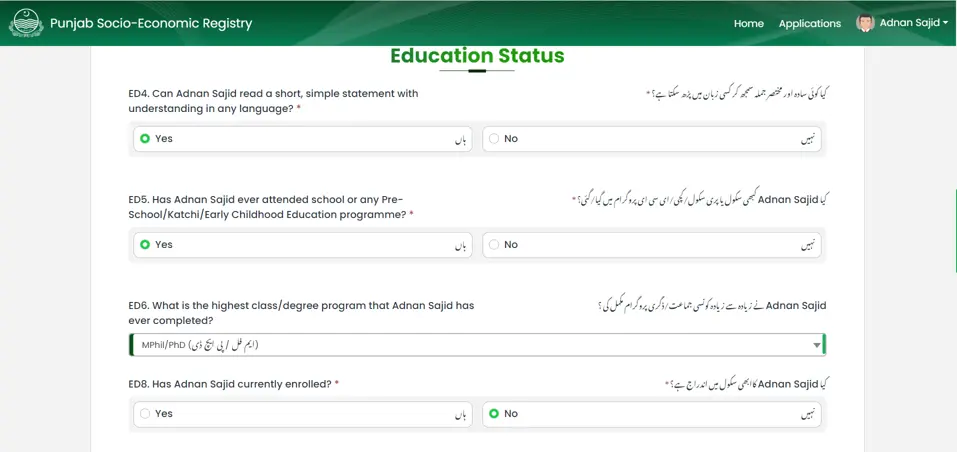
Step 5
PSER Program Include family members. Include details for each family member, including:
- Name
- CNIC No
- Date of Birth
- Relations with the head of the family
- Click “Add” to add each member.
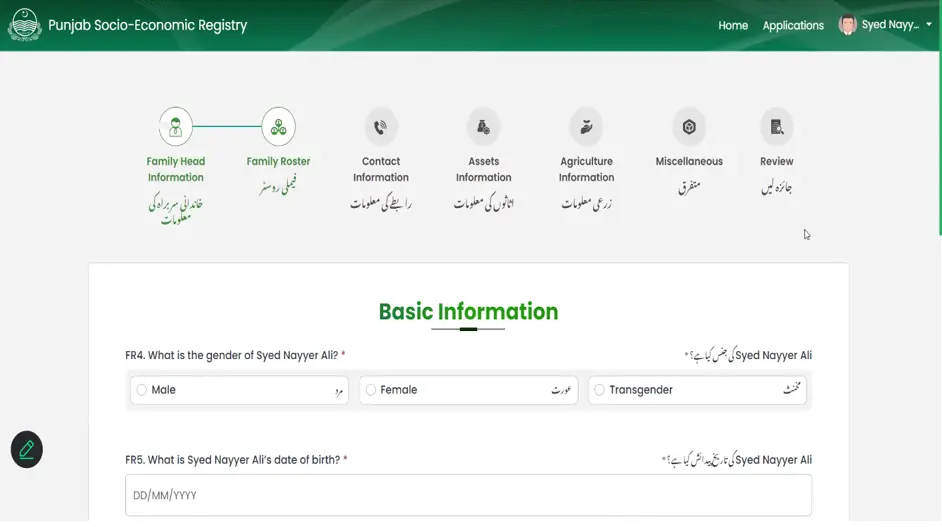
Step 6:
PSER Program Provide address details.
- Division
- District
- Tehsil
- Village/Town
- Nearest Post Office
- Click “Next”.
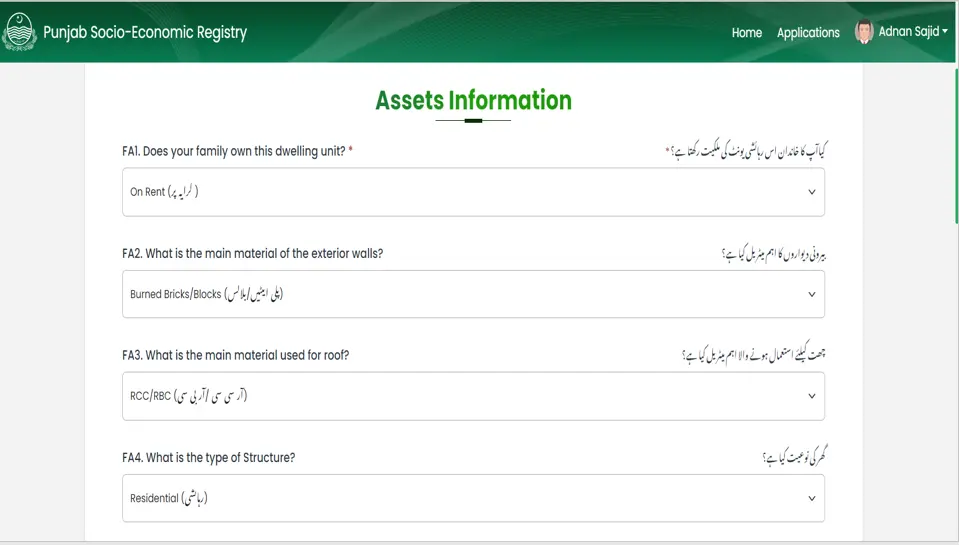
Step 7:
Answer the eligibility questions.
Answer questions about your family’s living conditions, such as:
- Home ownership
- Type of walls and ceiling
- Number of rooms
- Cooking fuel
- Type of toilet
- Click “Next”.
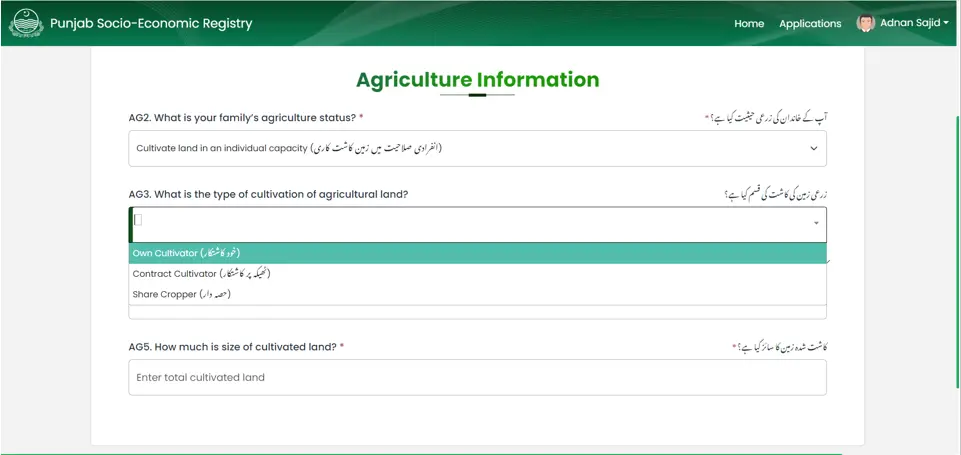
Step 8:
- Submit an application.
- Review your application carefully.
- Click “Submit” to complete the registration process.
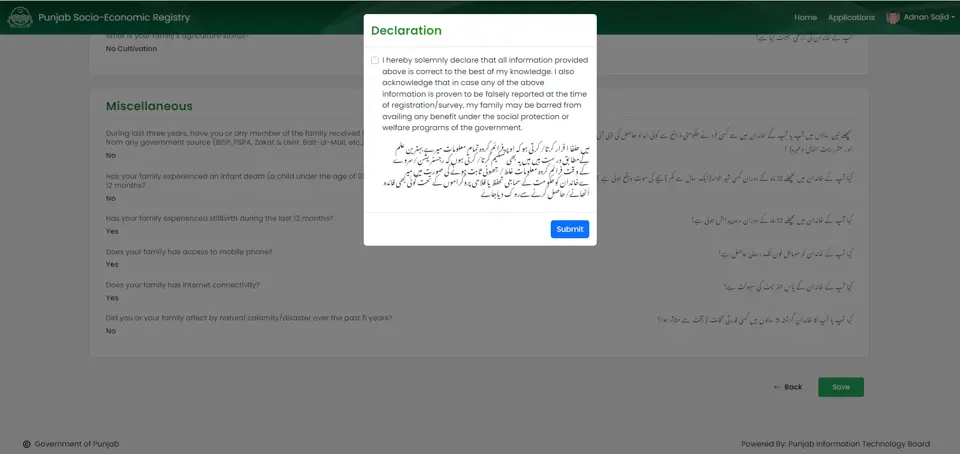
Step 9:
Log in to your account
- Return to the PSER website and click on “Login”.
- Enter your CNIC number and password to access your account dashboard.
- that’s it! You have successfully registered on PSER portal. Contact the PSER Support Team for assistance if you encounter any issues.
Objectives:
- To create a comprehensive database of socio-economically vulnerable households in Punjab.
- To identify and prioritize deserving households for various social security programs and initiatives.
- To provide a framework for effective targeting and allocation of resources.
Main Features:
- PSER Program Household Profiling: Collection of detailed information on household demographics, education, health, employment, income, assets, and living conditions.
- Assessment of Socio-Economic Vulnerability: Identification of households facing socio-economic challenges, such as poverty, disability, and lack of access to basic services.
- Scoring System: Assigning a unique score to each household based on their socio-economic vulnerability.
- Ranking and Prioritization: Rank households based on their scores to prioritize support and resources.
- Data Sharing: Sharing data with relevant stakeholders, such as government departments, NGOs, and development organizations.
Advantages of PSER Program:
- Targeted Support: Ensures that support reaches the most deserving households.
- Effective Resource Allocation: Enables efficient allocation of resources and funding.
- Data-driven decision-making: Provides a robust data framework for informed decision-making.
- Improved Service Delivery: Enhances the delivery of social services and programs.
Implementation of PSER Program:
- Survey Teams: Trained survey teams conduct door-to-door surveys to collect data.
- Mobile App: A mobile application is used to collect and transmit data in real time.
- Data Center: A centralized data center manages and analyzes the collected data.
The PSER survey plays an important role in identifying and supporting vulnerable households in Punjab, Pakistan, and serves as a model for similar initiatives in other regions.
The reason for the PSER program
The objectives of the Provincial Socio-Economic Registry (PSER) are to:
- Building a comprehensive database of socio-economically vulnerable households in Punjab, Pakistan.
- Identifying and prioritizing deserving households for various social security programs and initiatives.
- Providing a framework for effective targeting and allocation of resources.
- Ensuring transparency and accountability in distribution of social benefits and resources.
- Facilitating data-driven decision making for policy makers and stakeholders.
- To effectively target social services and programs to those who need them most.
- Reducing poverty and inequality by providing support to vulnerable households.
- To improve the overall well-being of citizens in Punjab, Pakistan.
- By achieving these objectives, PSER aims to positively impact the lives of vulnerable households in Punjab, Pakistan.
PSER Survey Registration Online
To register online for the PSER survey, follow these steps:
- Visit the official PSER website.
- Click on the “Survey Registration” button.
- Enter your CNIC number and click “Next”.
- Fill the registration form with your personal and family information.
- Add details of your family members.
- Provide your address and contact information.
- Answer qualifying questions about your family’s living conditions.
- Review and submit your application.
- You will receive a confirmation message with a unique survey ID.
- Keep your survey ID safe, as it will be used to access your survey results and benefits.
PSER Program Helpline
If you encounter any problems or need assistance, contact the PSER support team:
- Phone: 0800-02345
- Email: mailto:[email protected]
- Website: https://pser.punjab.gov.pk/
Various processes to register in PSER Program
To apply for the PSER program, follow these steps:
- Check Eligibility: Make sure you meet the eligibility criteria set by the PSER program.
- Collect Required Documents: Collect required documents, including:
- CNIC (National Identity Card)
- CNICs of family members
- Proof of income
- Proof of residence
- Other supporting documents (if applicable)
Online Registration:
- Visit the PSER website and register online:
- Fill the registration form.
- Upload required documents.
- Submit an application.
Survey Team Visit:
- Verify your documents.
A PSER survey team will visit your residence to:
- Conduct a socio-economic survey.
- Collect additional information (if needed)
Data Verification:
- PSER will verify your data and documents.
Scoring and Ranking:
- Your household will be assigned a score based on the socio-economic survey. Households will be ranked according to their scores.
Program Enrollment:
- If eligible, you will enroll in the PSER Program and receive benefits.
- Regular Updates: Keep updating your information to ensure continued eligibility.
Required Documents
To apply for the PSER program, you will need to provide the following documents:
- CNIC (National Identity Card): CNICs of yourself and your family members.
- Proof of Income: Documents that show your source of income, such as:
- Pay slips
- Pension documents
- Proof of business income
- Proof of agricultural income
Proof of Residence:
Documents verifying your address, such as:
- Utility Bill (Electricity, Gas, Water)
- Rental agreement
- Ownership documents (if you own the property)
Family Documents:
Documents related to your family members, such as:
- Birth certificate
- Marriage certificates
- Divorce or separation documents (if applicable)
Disability or health documents (if applicable):
Documents related to disability or health conditions, such as:
- Disability Certificates
- Medical reports
- Hospital records
Education documents (if applicable):
Documents related to your education, such as:
- School or college certificates
- Diploma
- Degrees
Other supporting documents (if applicable):
Any additional documents that may support your application, such as:
- Orphan or widow certificate
- Documents related to your profession or profession
Eligibility Criteria
The eligibility criteria for the PSER program are:
- Citizenship: Must be a citizen of Pakistan and a resident of Punjab.
- Poverty Line: Household income should be below the poverty line (determined by PSER).
- Weakness: With households:
- Disabled or elderly members
- Widow or orphan
- Chronic diseases
- Lack of education or employment
- Other risks
- Family size: household size and composition (eg, number of dependents).
- Sources of Income: Limited or no access to stable sources of income.
- Ownership of assets: Limited or no ownership of assets (eg, real estate, vehicles).
- Education level: Low education level or lack of access to education.
- Health condition: poor health condition or lack of access to health care.
- Shelter and Living Conditions: Substandard or inappropriate conditions.
- Social Exclusion: Households face social exclusion or discrimination.
What is the purpose of PSER?
The main objective of the Provincial Socio-Economic Registry PSER program is to:
- PSER program Identify and register vulnerable households in Punjab, Pakistan.
- Assess their socio-economic status to determine their eligibility for social benefits.
- Build a comprehensive database to facilitate targeted support and efficient service delivery.
- Reduce poverty and inequality by providing support to those who need it most.
- Improve access to social services such as health care, education, and employment opportunities.
- Enhancing transparency and accountability in the distribution of social benefits.
- Promoting community involvement in identification and verification of vulnerable households.
- Inform policy decisions with data-driven insights to address socio-economic challenges.
- By achieving these objectives, PSER contributes to a more equitable society, better quality of life and sustainable development in Punjab, Pakistan.
Conclusion
- Finally, the Provincial Socio-Economic Registry (PSER) program is an important initiative aimed at identifying, registering and supporting vulnerable households in Punjab, Pakistan.
- By building a comprehensive database and assessing socio-economic status, PSER ensures targeted support and effective service delivery.
- The program’s goals are aligned with global efforts to reduce poverty and inequality, and its data-driven approach informs policy decisions to address socioeconomic challenges.
Through PSER program, the government demonstrates its commitment to social welfare, transparency, and accountability, ultimately contributing to a more equitable society and better quality of life for vulnerable populations.
FAQ’s
How are households selected for PSER benefits?
Households are selected based on their Socio-Economic Vulnerability Score.
What documents are required for PSER registration?
PSER program Documents required include CNIC, proof of income, proof of residence, and family documents.
How do I register for PSER program?
Registration is done through a survey team visit or online application (if available).
Who is eligible for PSER?
Vulnerable households, including those with low income, disability, widowhood, and chronic illness, are eligible.
What is PSER?
PSER is a comprehensive database of socio-economically vulnerable households in Punjab, Pakistan.
What benefits do PSER households get?
Benefits include access to social services, financial assistance, and employment opportunities.
How often is the PSER database updated?
The database is regularly updated to ensure accuracy and relevance.
Is PSER data shared with other organizations?
Yes, data is shared with relevant stakeholders for effective service delivery.
How can I check my PSER status?
You can check your status through PSER website or by contacting PSER helpline.
Who can I contact with questions about the PSER?
For more information you can contact PSER helpline or visit PSER website.
Note: These FAQs are general and may change. For latest information, please visit PSER official website or contact PSER officials directly.

